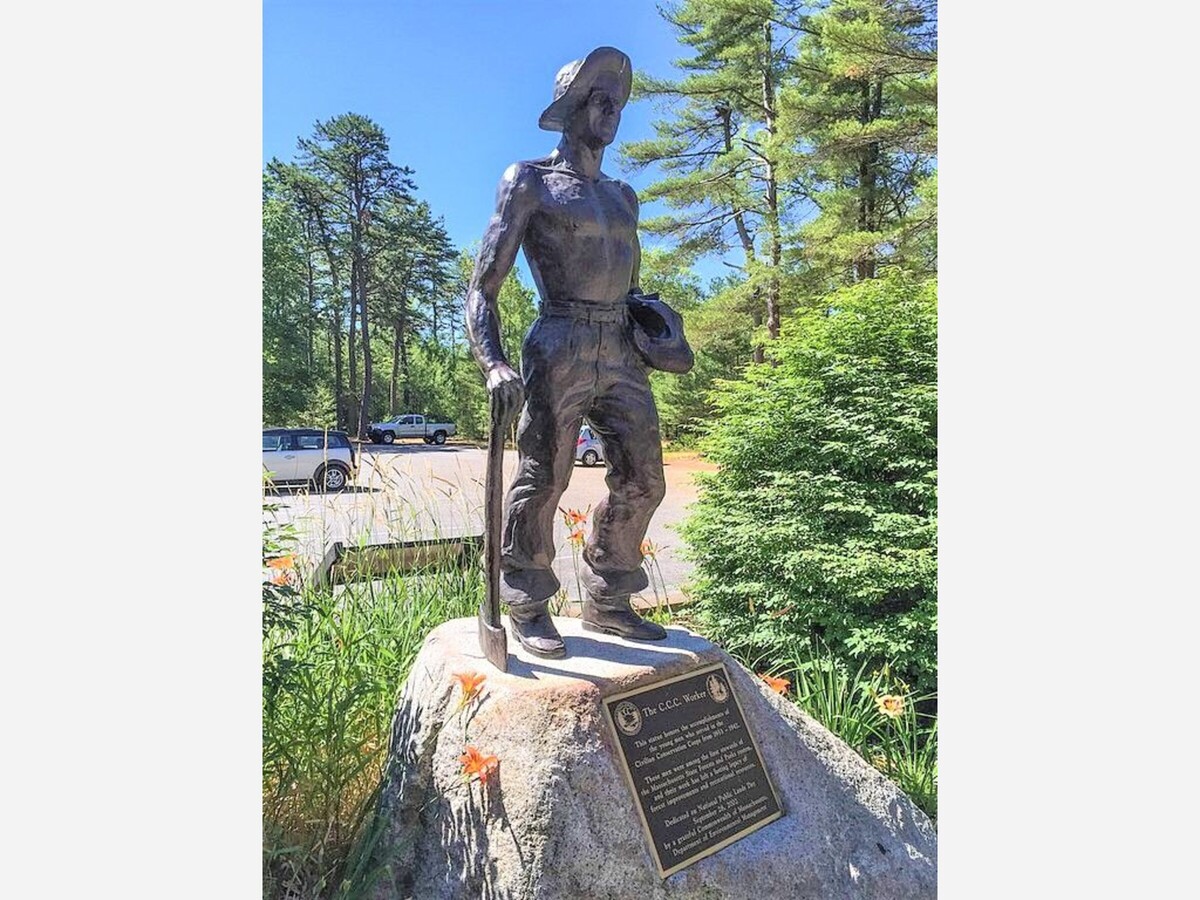Image

Above, statue of CCC Worker in Freetown-Fall River State Forest.
New Initiative Celebrates the 90th Anniversary of CCC, a Roosevelt-era Program to Provide Job Opportunities and Improve the Country’s Forests During the Great Depression
In honor of the 90th anniversary of the Civilian Conservation Corps (CCC), the Department of Conservation and Recreation (DCR) has announced a new initiative to boost visitor engagement in our state park system by encouraging visitors to take a selfie in front of 10 historic structures in DCR parks that were built by the CCC in the 1930s and 1940s. The CCC was established in 1933 by President Franklin Delano Roosevelt as part of the New Deal to provide work opportunities to young men and improve the country’s forests and recreational resources during the Great Depression.
Nine decades later, the work of the CCC still forms the cornerstone of the Massachusetts park system. Roads, stonewalls, trails, ponds, forest plantations and recreational facilities built by the CCC can be found in every region of the state, including, notably, Franklin State Forest.
“The Civilian Conservation Corps made incredible contributions to America’s national and state parks system including our own park system here in Massachusetts that we still rely on today for access to natural, recreational, and cultural resources,” said DCR Commissioner Brian Arrigo. “I’m excited to visit these historical sites with my own family this summer and teach my sons about the legacy of the CCC, when we take our selfies. Initiatives like this help us build the next generation of stewards for our parks.”
The CCC was a work relief program that provided jobs and housing for millions of young men from 1933 to 1942. The CCC employees’ work included fighting forest fires, planting over three billion trees, building wildlife refuges, and working to construct trails and campground facilities in parks nationwide, helping to create the current national and state park systems. Massachusetts hosted 68 CCC camps where 100,000 young men lived and worked, creating structures and amenities in our park system, some of which are still in use, today.
As part of the CCC Selfies initiative, park visitors can learn about the CCC, their work, and building structures at a particular site from a descriptive placard at these sites, which also features a QR code leading to a storymap and video that provide a history of the CCC and its legacy in Massachusetts. This self-guided activity provides a fun way to see Massachusetts’ state parks, as well as learn about and celebrate the history of the CCC and their contributions to the park system we know today.
Signs with the CCC Selfie logo will mark each of the nine sites in the initiative – one for each of the nine decades and a bonus site featuring the CCC Worker Statue. The specific locations are:
· Blue Hills Reservation – Chickatawbut Tower, Quincy
· Douglas State Forest –Pavilion and stonework at Wallum Lake Recreation Area, Douglas
· Harold Parker State Forest – Berry Pond Pavilion, N. Andover
· Mohawk Trail State Forest – Administration Building, Charlemont
· Mount Greylock State Reservation – Bascom Lodge, Adams
· Mount Tom State Reservation – Visitor Center, Holyoke
· Nickerson State Forest – CCC Fireplace and camp area, Brewster
· Pittsfield State Forest – Ski Shelter, Pittsfield
· Upton State Forest – Administration Building, Upton
· BONUS – Freetown-Fall River State Forest –statue commemorating the CCC workers, Freetown
DCR encourages visitors to post their selfie to Instagram and Twitter, include the site location, and tag @MassDCR. DCR will then share the selfies on the agency’s social media.
The DCR reached out to the Franklin Historical Commission last year with their plans to create explanatory signage relating to the former Franklin CCC camp located in what is now the State Forest. The current status of that effort is not clear.